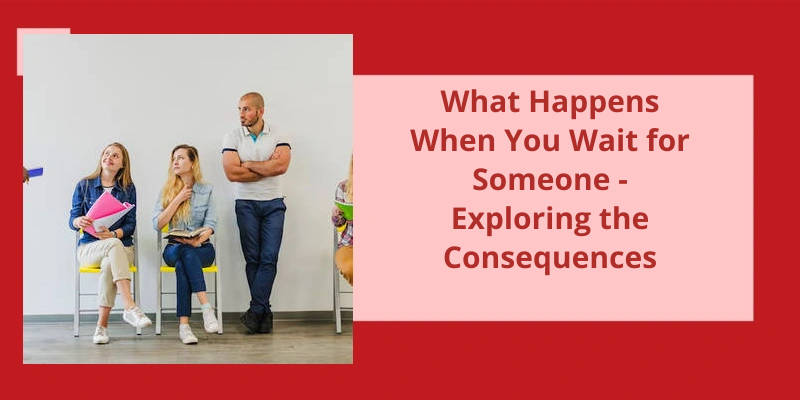As human beings, we’re wired to seek connection and bond with others. Relationships, whether casual or serious, often require some level of communication and interaction to thrive. However, there are times when we may feel overwhelmed or frustrated by a particular person and may need some space to sort out our emotions. In such instances, the idea of ghosting – intentionally cutting off contact with someone without any explanation or forewarning – may seem appealing. But is it the best course of action? Should you ghost her for a day? The answer may not be as simple as it seems. There are several factors to consider, including the nature and history of your relationship, the severity of the situation, and the potential impact on both parties involved. Ultimately, the decision to ghost someone shouldn’t be taken lightly and should be based on careful reflection and consideration of all the factors at play.
Is One Day of No Contact Ghosting?
The term ghosting refers to a situation in which someone suddenly ceases all communication with another individual without explanation. It’s a frustrating and hurtful experience, leaving the person who’s ghosted with many questions and concerns. While every relationship is different, three days is enough time to consider yourself ghosted. This is because communication is an essential part of any relationship, and an unexplained absence of it for multiple days can cause anxiety and confusion.
Of course, there are legitimate reasons for not communicating with someone for a day or two. Emergencies, unexpected schedule changes, and other unforeseen circumstances can arise, causing a temporary delay in communication. However, if the lack of communication persists for more than three days, it can be classified as ghosting. This is especially true if the relationship is relatively new or if there’s been consistent communication prior to the sudden silence.
Regardless of the relationship dynamics, being ghosted can be a painful experience. It leaves the person wondering what they did wrong, what could have been done differently, and why the other person felt the need to disappear without explanation. It can also cause a significant blow to ones self-esteem and confidence.
While ghosting is typically frowned upon as an insensitive way to end communication with someone, there are certain scenarios where it may be a necessary and appropriate option. In situations where continued communication can be harmful or dangerous, ghosting may be the best course of action to protect oneself.
Is Ghosting Her a Good Idea?
Firstly, it’s important to understand the context in which you want to ghost her. If she’s been abusive, manipulative, or controlling towards you, then ghosting may be a good idea to protect yourself from further harm. This could be emotionally or physically, depending on the situation. It’s important to prioritize your safety and well-being above all else.
Secondly, ghosting may be an appropriate option if you’ve tried to communicate your feelings or intentions with her, but she continues to disrespect your boundaries. In this case, ghosting can act as a clear signal that you’re no longer interested in engaging with her. It’s important to note that communication is key in any relationship, but if your attempts to communicate are being ignored or dismissed, it may be time to move on.
Thirdly, ghosting can be a good idea if you’re dealing with someone who’s emotionally unstable or has a history of irrational behavior. In these cases, any type of communication may only fuel their emotions and lead to further chaos.
Fourthly, it’s important to consider the impact that ghosting may have on her. It’s possible that she may feel hurt, confused, or angry if you suddenly stop communicating with her. If you’re genuinely concerned for her well-being, it may be helpful to suggest seeking professional help or reaching out to a trusted friend or family member.
Are you avoiding confrontation or feeling overwhelmed by the relationship? If so, it may be worthwhile to work through these feelings with a therapist or counselor before making any decisions. Ghosting shouldn’t be a default option, but rather a decision made with careful consideration and respect for all parties involved.
The Consequences of Ghosting on Mental Health and Self-Esteem.
Ghosting is a practice where one individual suddenly cuts all communication with another individual without any explanation or warning. It can have serious consequences on mental health and self-esteem of the person who’s ghosted. Ghosting can lead to feelings of rejection, worthlessness, and a lack of closure, which can cause long term emotional damage.
When it comes to modern dating, ghosting has become an all-too-common method of ending a relationship. However, what many people fail to realize is the impact this can have on the person being ghosted. As we explore the various facets of ghosting, it’s important to consider the emotional ramifications it can have on the person you’re leaving behind.
Does Ghosting a Girl Hurt Her?
For women, being ghosted by a potential romantic interest can be even more hurtful as it can shatter their expectations and hopes for a future together. Women often invest a lot of time and energy into building a connection with someone, and when that person disappears without explanation, it can be a huge blow to their self-confidence and self-worth.
It shows a lack of respect and consideration for the other persons feelings and can leave them feeling rejected and hurt. If you need to end a relationship or connection with someone, it’s important to do so with kindness and honesty.
If you’ve ghosted someone and are feeling guilty about it, it may be helpful to reach out and apologize for the way you ended things. This can provide some closure for the other person and help you to move on as well. It’s important to remember that ghosting can have lasting effects on the person youve ghosted, and it’s something that should be avoided at all costs.
Ghosting a girl can be incredibly hurtful and have long-lasting effects on her emotional and mental wellbeing. It’s important to consider the impact of your actions and to always treat others with kindness and respect. Seek support from friends, family, or a therapist to help you navigate the complicated emotions that come with ghosting. Lets all make a conscious effort to be better to one another and avoid causing unnecessary pain through ghosting.
Source: Why is ghosting so hurtful?..
Dealing with someone who’s ghosted you is undoubtedly a frustrating experience that can leave you feeling confused and hurt. While the best course of action is to move on, there may come a time when you want closure or an explanation for why the person disappeared. In such instances, you might find yourself wondering if it’s worth it to reach out to them one last time. In this article, we’ll explore some important considerations to help you make the best decision for your situation.
Should I Reply to Someone Who Ghosted Me?
Getting ghosted can be a frustrating experience, and it’s easy to feel hurt by the lack of communication from the other person. While the best course of action is typically to move on without saying anything, there may be instances where reaching out to the ghoster for closure is appropriate.
Before deciding whether to send a message to your ghoster, it’s crucial to consider your intentions. If youre hoping to rekindle a connection or get back together with them, sending a message may not be the best strategy. However, if youre looking for closure or an explanation for their behavior, a polite and concise message could be a way to get the answers you need.
When crafting your message, it’s essential to avoid coming across as confrontational or accusatory. Remember that your ghoster may be dealing with their own personal issues, and you don’t want to add to their stress or anxiety. Instead, focus on expressing your feelings calmly and honestly while also being respectful of their time and boundaries.
If you decide to send a message, make sure it’s short and to the point. Avoid sending paragraphs of text or coming across as desperate or needy. Stick to the facts and avoid making assumptions or placing blame. Remember that your goal isn’t to change the ghosters mind or force a response, but to gain closure and move on.
Ultimately, the most important thing is to focus on your own healing and well-being, rather than waiting for someone elses response or validation.
How to Cope With Being Ghosted in a Relationship
- Take some time to process your emotions and allow yourself to be sad or disappointed
- Try reaching out to the person and ask for an explanation, but don’t become obsessive
- Don’t blame yourself or try to overanalyze the situation
- Focus on your own hobbies and interests to distract yourself from the situation
- Surround yourself with supportive friends and family who can listen to you and be there for you
- Consider talking to a professional therapist or counselor to help you cope with the experience
- Remember that being ghosted is a reflection of the other person’s actions, not your worth as a person
According to experts, ghosting has become a common phenomenon in the digital age, especially when it comes to dating and relationships. While it can be hurtful and disrespectful in some situations, ghosting can also be seen as a healthy way of protecting one’s mental health and setting boundaries with toxic people. In this article, we’ll delve deeper into the topic of ghosting and explore it’s potential benefits and downsides.
Can Ghosting Be Healthy?
Sometimes, people may find themselves in a situation where communication with someone is creating negative energy and is hampering their mental well-being. In such a scenario, ghosting can be a healthy way of saying goodbye and moving on. It allows one to take control of their situation and break free from relationships that are no longer serving them.
It allows for an escape from constant communication and social overload, and can provide a sense of respite and peace. This can be particularly important for individuals with anxiety, depression or any other emotional stressors.
However, it’s essential to use it the right way for it to be effective. It shouldn’t be used as a way to avoid necessary conversations, and it’s crucial to communicate with integrity and respect with people who deserve it.
The Psychology of Ghosting: Understanding the Underlying Reasons for Why People Ghost and the Impact It Has on Both Parties Involved.
- Lack of effective communication skills
- Fear of confrontation or conflict
- Desire to avoid hurting someone’s feelings
- Feeling overwhelmed or emotionally unavailable
- Perceived sense of superiority or disrespect towards the other person
- Personal issues or life circumstances that take priority
- Impact on the person being ghosted includes feelings of confusion, rejection, and lowered self-esteem
- Impact on the person doing the ghosting may include guilt, avoidance of future relationships, and damage to their reputation
Conclusion
In conclusion, whether or not to "ghost" someone for a day is a personal decision that ultimately depends on the nature of your relationship and the situation at hand. While some may argue that a day of silence can add mystery and excitement, it can also be hurtful and lead to misunderstandings. Communication and honesty are key in any relationship, and it’s important to consider how your actions may affect the other person. Ultimately, treating others with empathy and respect should be the guiding principle in making any decision.






